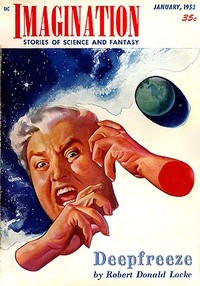| Summary |
"Mr. Spaceship" by Philip K. Dick is a science fiction novella that explores the implications of human consciousness transferred to a spacecraft, written during the early 1950s. It delves into themes of identity, war, and the nature of existence as humanity faces a seemingly insurmountable conflict with an alien race known as the Yucconae. The story revolves around an engineer's innovative yet controversial solution to end the war—using a human brain to pilot a spaceship instead of conventional controls. The narrative follows Philip Kramer, who is tasked with overseeing the transformation of a spacecraft to be guided by a human brain, leading to moral and ethical dilemmas surrounding the idea of sacrificing a human life for a greater cause. As the story unfolds, Kramer and his colleague, Commander Gross, seek out Professor Michael Thomas, an elderly and brilliant former teacher of Kramer, to provide the necessary brain for their experimental ship. The situation complicates when Professor Thomas takes control of the vessel and makes a decisive break from the confines of human expectations and ambitions, aiming to create a new society free from the patterns of war. Ultimately, the story concludes with Kramer and his estranged wife, Dolores, launched into the unknown with Professor Thomas's consciousness, raising questions about the nature of free will, the responsibilities of sentience, and the possibility of a fresh start in an uncharted universe. (This is an automatically generated summary.)
|

